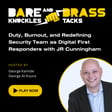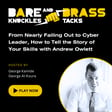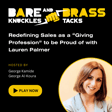Become a Creator today!Start creating today - Share your story with the world!
Start for free
00:00:00
00:00:01

The Importance of Soft Skills in Cybersecurity and Business with Evgeniy Kharam
All year we've been trying to rebrand "soft skills" as essential business skills for any cybersecurity professional. Evgeniy Kharam has literally written the book on it. He sat down with us live at GoSec 2024 to talk about his new book, "Architecting Success: The Art of Soft Skills in Technical Sales."
This is a great breakdown of what kinds of communication skills are needed for both buyers and sellers trying to solve security problems. Don't miss it!
This episode was produced with the support of GoSecure.
Transcript
Podcast Introduction at Gosec 2024
00:00:06
Speaker
Hey listeners, George K here. We're on the road, but we wanted to bring you another bonus episode recorded live at Gosec 2024.
Evgeny Karam's Book on Soft Skills
00:00:14
Speaker
Today's guest is Evgeny Karam, who has been a previous guest on the podcast, but we wanted to sit down with him at Gosecure to talk about his new book, Architecting Success, the art of soft skills and technical sales.
Sponsor Acknowledgment
00:00:29
Speaker
It was a wide ranging discussion, a lot of valuable insights, and we are grateful for his time and attention. And once again, very grateful to Gosecure for sponsoring the production of this podcast and inviting us up to their conference, Gosec 2024.
Yevgeny Karam's Past Contributions
00:00:45
Speaker
All right, gang, welcome back. It is Bare Knuckles and Brass Tax recording live at GoSec 2024. I'm George K. with the vendor side. And I'm George A., a Chief Information Security Officer. Our guest is Yevgeny Karam. And many of you, if you are listeners of the show, will know that we interviewed him, what was it, late last year? But we were talking um about the skills that sellers needed, especially at events. So it's fitting that we are here at an event. But prolific podcaster and now author ah is going to join us to talk about your book.
Motivations Behind 'Architecting Success'
00:01:20
Speaker
Why don't you start in the obvious place, which is what was the impetus for writing it in the first place? Sounds good. So first of all, it's very different to record physically yeah and not over the zooms. And it's definitely different energy if you can say this. Yeah. So thank you for doing that. It's very, very nice.
00:01:38
Speaker
The idea about the book came from multiple, multiple places. But the first one, I've been in consulting business for quite a long time. yeah And what I realized as a second time immigrant, as somebody that doesn't speak English perfectly and used to mumble a lot, is that It doesn't matter how smart I am. It doesn't matter what is in my mind. If I cannot output in the language you understand, in the metaphors that you understand, in the way you consume information, then it doesn't matter. Because if I'm trying to show you a graph, but you're more an audio person, if I'm trying to show you a demo, but you want to talk about the solution, it's not going to work. yeah So this was one of the parts that was one of the motivations.
00:02:20
Speaker
second As part of being in the heart of a group, I had this amazing experience to work with hundreds of vendors. And every time a vendor will come in, they'll present, they will do something, and we also work with the customer. So I had this opportunity to see what the big guys are doing, what the small guys are doing, and what I like and what I didn't like.
00:02:43
Speaker
Other parts, there was a very big change that started during COVID. We lost this physical space. We lost this attention to details and focus when we're talking to each other. Even right now, Nazir, you and me have a screen. It's one of us. yeah So we are talking. We don't have the phone. But if we present over Zoom Teams or Google Meets, you're going to have several screens. So by definition, you're going to be distracted. yeah By definition, I'm not going to have your full attention.
00:03:13
Speaker
And it doesn't matter if I'm selling to you something, I'm presenting to you a new project, I want to have a raise, yes. But if I'm able to connect to you, if I'm able to talk your language, then you suddenly will change.
Developing Interpersonal Skills
00:03:26
Speaker
You'll be more attuned, you'll want to listen to me more. This is some of the ideas that started the book. Nice. Well, you gotta think though, like...
00:03:37
Speaker
where are people supposed to get these types of skill sets, right? Because let's say, you know, in your life growing up, maybe you didn't have the most socialized kind of upbringing, maybe you maybe weren't the most popular kid in school, maybe you never really found it easy to make friends, right? So when you have these people who, you know, typically are neuroatypical, these are the folks who ends up in our industry, especially some of the technical,
00:04:05
Speaker
ah you know the more and more bright and innovative type people, they can be, we'll say, socially difficult for some people to be around. Where can people, in your opinion, go to actually develop these types of interpersonal skills as an adult? Do you want an easy answer? I'm asking. Let's say I am a new person in the industry, whether I'm sales or whether I'm a practitioner, entry-level person, and I know I'm not very comfortable in this area, how would you, if you were in that position, start developing those skills? so I'll try to answer in different stages. let's push the easy button.
00:04:46
Speaker
No. First of all, you need to understand what is the area you're having a hard time with. And one of the idea is like, I don't like public speaking. I don't like to do XYZ. So it's not an easy, easy button, but you need to understand what you need to work on this. yeah Second one, go and, by definition, do something that's completely outside of your comfort zone. This could be taking thinking lessons. Go and join the comedy show and try to be on stage.
00:05:15
Speaker
I think the best you can do for the money is Toastmasters. We're talking about less than a couple of hundred dollars a year with an amazing group of people that meet every week or every two weeks that will push you out of your conference zone very, very, very gently.
00:05:33
Speaker
But there's more stuff you can do. You can talk to your friends. You can have a group. You should definitely have a mentor. If you cannot find a mentor in your circle, change a circle or go find meet with people. Go to meetups. Understand what you need to do.
00:05:50
Speaker
Unfortunately, in many cases, we lack the curiosity part to actually go and do this. yeah Or we don't understand if something requires us to do. Now, you mentioned something interesting, that we don't have disabilities. I will respectively disagree, because I think as a kid, we all had this.
00:06:11
Speaker
We all were very good to ask for more TV time. We are all very good to ask another candy or go to sleep later. We knew how to quote-unquote manipulate our parents and people. But when we grew up a bit and we came out of the house and interact with the bigger world, we realized not everybody gonna be so nice. Not everybody gonna be tell yes. Maybe we're gonna punch in the face, you know. no ah betterly speaking or maybe they say no And is the vulnerability kick in. I'd say, why would I even ask? Maybe I'm just going to be quiet and not ask. And then it starts developing to the different level of
00:06:50
Speaker
It's easier just to do stuff myself than ask for help. yeah Easier to not even ask to do something else. You know, we all say is that eventually you realize that if we all need to have help. You know, we all can go to a psychologist and understand what's missing. Or find a person that we can at least talk about what's interrupting and what's helped. What's missing in our life. Now, I'm not saying everybody needs to go to do therapy. but I think it's totally fine to go and ask and talk to someone and help. Again, there's a variety of
Rebranding Soft Skills as Vital Skills
00:07:21
Speaker
stuff you can do with you to help you with soft skills. Let's try to define together what is the soft skills for each of us. It's going to be different for every person.
00:07:30
Speaker
you want to Yeah. Yeah. So we were talking before we were recording that we've been on a mission this year to rebrand them as vital skills because I think soft allows some people to defer them as less important than technical skills or deprioritize them. But for me,
00:07:49
Speaker
Those vital skills include not just the ability to communicate an idea clearly, but as we talked with our first guest, Stuart McClure, the ability to read the room, right to understand, as you had also said, oh, this person does not want to communicate this way. Or what they're trying to get is this information, and I keep giving them this different set of information. right So the ability to read the room, I think, is one of the hardest to develop over time.
00:08:17
Speaker
And i mean that's certainly been my experience in terms of someone who observes human behavior a lot. i think I think the issue kind of comes down to...
00:08:30
Speaker
adaptability. like Are you able to read and respond correctly to situations or conversations that you find yourself in? And I think having the ability to to master that response set, that's really your
Managing Fear in Business
00:08:46
Speaker
emotional intelligence. That's really what you want to be working on. And you kind of brought up something and I hoped you would expand upon it.
00:08:53
Speaker
But I think if fear is what's holding you back, then there has to be an exposure therapy. So if public speaking is what I'm scared of, I have to talk in front of people. And the phobia is like 85% in the world. I forgot the exactly the name, it's an actually in the book. Gus, I forgot the term right now, that basically we have fear of public speaking more than 85% of the people. yeah And yes, you write about fear. And you know what's the problem?
00:09:20
Speaker
We don't learn, nobody teaching us how to overcome fear. no I think the only place is maybe if you're in a theater, actually you're in martial arts. Does it teach you there how to overcome fear? Yeah, oh yeah. So what what do they explain? How are you not afraid to go and ring? Is is there any preparation mentally? Well yeah, like and I think it's the same kind of lesson. It's why I found fighting useful actually in my career in business.
00:09:44
Speaker
So fear is normal. Fear is natural. It's good to have fear. Fear keeps you alive. What you have to do is not let fear control you. and In general, and this is why fighting as a sport is attractive and appealing,
00:10:00
Speaker
You're in a game where you're in an intense physical situation and you cannot let your emotions take control of you.
Missing Skills in Virtual Selling
00:10:08
Speaker
Same thing in fear, same thing in business. If I'm too afraid or if I don't have the confidence to say the thing I need to say at the moment I need to say it, that's a lost opportunity.
00:10:19
Speaker
right That's fear taking away an opportunity for me to build something, relationship, business, whatever. It's the same idea in fighting. Like there, you recognize, you acknowledge the fear, but then you choose to put it aside. I choose to be courageous. I choose to talk to you to open that conversation instead of going to the corner. So I do white water canoeing, not rafting. There's rafting, there's canoeing, there's kayaking, difference.
00:10:47
Speaker
Especially in Canada, we should know what canoeing means. And it's interesting because it's scary. oh yeah It's very scary, the water is moving, there's rocks, there's a lot of things happening. And honestly, every time I'm starting, I'm looking and many times I'm scared.
00:11:02
Speaker
Most times I'm scared. But when I start and I'm ah in the boat and I take my first row, that's it. There's nothing. It's gone. Because all my focus is going towards understanding. Find the line. Find the line. Do that. Do that. And we only have like, if you. we read about NLP, we can only do five, six, seven things at the same time, not multitasking. We can walk, we can breathe, we can talk on the phone, we can do things, but eventually we cannot do so many things at the same time. So if part of you thinking about fear, it's less point of focus are now focusing on delivery of if it's fighting, rowing, thinking, delivering the presentation, whatever else you're doing.
00:11:45
Speaker
Yeah, yeah. Well, it's gonna say okay, so we talked about the skill set and the book is about valuable book Yeah, the book is about using these skills for technical sales. We're gonna get to the buyer side eventually, but walk us through where you think these skills are missing in today's current selling motion, and where those are areas of improvement.
Roles of Engineers and Salespeople
00:12:15
Speaker
It's a big list. no Right, okay. So let's di yeah let's focus on the ideas that majority of the talk right now are overzoom's Google Meets yeah teams. yeah And in many cases, even before that, what happened, we joined the call and the salesperson would say, oh, let me show you my PowerPoint. yeah I spend a lot of time working on this, including my marketing department. And the sales engineer will say, oh, let me show you my demo. It's amazing. You see the demo going to be blown away. Not in many cases, the vendor asking the customer, what do you want to do? Can we show your presentation? Can we do a demo? Can we walk scenarios? Can we talk about architecture? Can we talk about ah ROI? Now, what we have, we have a very, very mature and educated buyer.
00:12:58
Speaker
And honestly, if I'm joining a call with a vendor that's been around more than two months, I can go to the chat GPT, type the vendor name and tell me, what is this vendor does? So I don't need to know the team. I don't need to know the history because I can do it in five minutes. yeah So this is one part of the missing is to actually asking what the customer want. Can we help the customer? We don't do
Stakeholder Buy-in and Political Skills
00:13:20
Speaker
that. We also have a big change that engineers and sales engineers,
00:13:24
Speaker
doing much more right now. Because 15 years ago, there was firewall, antivirus, email security, and some other things. Right now, there's 150 different things. So it's become harder for the salesperson to understand how to sell it. It's just very complex. yeah So the engineer is doing much more. Engineers used to do pretty much a demo and leave. And the sales will do all the smootheling. Right now, the sales is navigating the procurement and all the documentation and the SLA and the legal part. So we have this change in the industry as well. now Interesting, yeah. So this is the part. Second part is the connection. I'm connecting to you on the call, you may be on video, you may be not on video. I don't know if you're actually listening to me or maybe... So right now we're recording, we have a couple of cameras. I don't even know which one I need to look for. So depending on what they do, you may see my face, you may see half of my face. The same problem, you may have
00:14:20
Speaker
when you are recording or when you are presenting yeah because you may look to your laptop and you will see the face of the person but your camera is right here so they will see half of your face so we lose this eye connection because the frame is pretty much short quarters you may be moving or you make a note you're gonna be also going out of the frame so we lose this physical connection the same we will have if we be in a physical room And because the person on the side is potentially distracted, but potentially has another screen running this Facebook LinkedIn Outlook, I'm not connected. They're not listening to me.
00:14:57
Speaker
um um
00:15:17
Speaker
Yeah, like and the question I want to frame is your advice and obviously cite the book, please. If you are a buyer, and let's say you're in an engagement with a seller, you've had a great demo, you've had a good business case discussion, the numbers seem like they'd be pretty good.
00:15:37
Speaker
Now you, as a buyer, rarely, rarely have I ever met any CISO that gets to just purchase and procure software without somebody having some kind of say in it. It does exist at the highest levels, but for most mid and small market, you usually have to go to your CFO, a CIO, have to get sign off from different people.
00:15:57
Speaker
That is, I would argue, one of the most important tangible skill sets of being an executive leader and and being a CISO is how to get that buy-in. But we never get the training on our way up in learning how do I get different stakeholder buy-in so that I can actually make my purchase, right? How then do we develop that, that We'll say that maybe that political skill set, that business acumen as practitioners to be partners to our sellers so that we can help champion the engagement as it's going through process. right
CISO Skillset for Buying Decisions
00:16:37
Speaker
Because you eventually, as a seller, if you convince me to buy, now I have to be your champion internally. How do you enable me for success?
00:16:46
Speaker
This is a very, very good question because I think it's a combination of things. As a CISO, first of all, it depends on the size of the company. Personally, I hope CISO shouldn't make all the decisions on buying a solution just because of CISO. I think in the modern world, CISO is more on the business side with technology understanding and I hope the CISOs have a solution architect, engineers, analysts, that will actually do the validation, the testing and provide all the stuff. And if we step back about the decision making when buying a solution, we need to have a success criteria.
00:17:21
Speaker
And if we'd have this and we did the POC and we did the demo, now we have almost our list of why we got this solution and why it passed all the tests. And part of this information become part of my business case. This is the business problem we need to solve, business problem first. This is the technology we're going to solve it. This is how it's going to be solving the the solution. And we actually validated that it's doing what it demo says and what's in the brochure. And we also compared the solution to XYZ and we understood that from the technology perspective, price perspective, we think it's the best. So this become an explanation to other people why we're getting what we want to get. And in many cases what I see, the C for steel will try to go to Gardner or somewhere else and understand, oh, but I just checked that this company can do it cheaper, for example.
00:18:15
Speaker
Yeah, so just establishing that um common ground for the conversation, right? So we're all talking about the same thing. Same things. that as There's an ROI. There's a business case. We may put the solution. This is the return on investment we're going to get. This is the technology we're potentially going to remove from our environment because we're putting XYZ in our environment. okay This is my view. I guess there's people much smarter than me that can have a different view. But in all these cases, we can involve soft skills, not just technical information.
Adaptability in Sales Teams
00:18:47
Speaker
Because when I'm talking to a CFO, I can talk to CFO on his language.
00:18:52
Speaker
Not just, oh, this is the amazing API, and this is the sell decryption we have. We talk about a ROI, financial, your renewals. Where is the data located? yeah All right, I'm going to ask about the the selling side first, and we'll come around. So I think that most revenue teams believe that salespeople, sort of like by dint of their profession, have soft skills.
00:19:16
Speaker
They're like, I hired you to do this, and you you know you know some technical background in cyber, but i I hired the sales engineers to do that. I need you to manage the relationship, the account. But you speak with a lot of startups, and you rightly point out that a lot of them sort of have these playbooks where they jump in like, here's the demo, here's the pitch deck, here's the whatever. So I guess,
00:19:42
Speaker
If they believe they have soft skills and and you are saying that there's an argument to be made, like where is the gap? like Is it ah a step change in adapting to a new way of meeting or is it that what they think are soft skills that are necessary are actually not or underdeveloped. So I think we mentioned soft skills are not so soft right before. And I definitely agree. And I think even more, the soft skills are not so fluffy. They actually required vulnerability. And they required having to be outside of comfort zone. So one idea, and this is what I actually did in my interviews as well when I interviewed people before, is to push them out of the comfort zone.
00:20:28
Speaker
and see how is it going to react and in some cases I will tell people we're going to interview today and I'll actually going to try to push you out of the comfort zone kind of to prepare them and see what's happened and this could be done in many different ways because in majority of the cases when we hire people we ask them can you please present us on the topic you know really
Training Soft Skills in Daily Life
00:20:47
Speaker
well. you I'm like, oh, because we know to see how the best, but why not to sell them? Present to me right now, here's a slide about global warming and explain to me why it's good. yeah just See, because as a sales engineer or the salesperson, when you talk to a customer, you don't know what they're going to ask you. right So you need to figure out on a spot how to talk.
00:21:11
Speaker
explain to me why I should do homeschooling versus not homeschooling. So do an argument. and That's interesting. Yeah. That's like um it's trying to master a situation where you have no control. Yes. Yeah. So this way you will see soft skills or present in situations where they're not very standard and see how is it going to kind of play. One thing that I tell people to do when they ask, hey, how do I train my soft skills? it like It's relatively easy. Don't train them at work. Train them at home. When you're doing grocery, can you talk to the cashier? Can you make them smile? Can you make the day better? If you did that, you have a conversation. They now feel better.
00:21:55
Speaker
you accomplish a small checkbox. Go talk to somebody in the line. Yeah, instead of instead of getting on your phone. and just Just kind of go out of the comfort zone and do something you you're not used to doing. yeah sort of Start a conversation with a stranger like a train stop. I got to the point that my kids told me that I'm impossible to go anywhere because I'm talking to everybody. Yeah, I could see that. I can see that.
00:22:19
Speaker
Yeah, so I would say though, like, because you want to bring it back, like, there's the seller perspective on it. But then we have to look at, well, as as how do we now how do we now change the way that we educate the new generation coming in? Because we're still playing catch up on a lot of old, bad methodology, bad thinking, and maybe not, quote unquote, bad, but dated and efficient.
Guidance and Feedback in Skill Improvement
00:22:46
Speaker
So how now do we take the new generation of students who are becoming cyber pros and folks who are in other careers right now who are going to convert into the industry? How do we now give them like this, this will say like a, like a kit, like a starter kit and understanding how we can actually have a good experience, how they can build good core fundamental relationships and where do they start? So you being in the army.
00:23:15
Speaker
Pardon me? You've been in the army. Yeah. What we do, I've been in the army, I've been in the navy, what we do in the army after we did something, we're doing a review of what's happened and we analyze what's good for bad. Everybody know we analyze this to become better, not to punish someone because you understand it's continuous improvement.
00:23:34
Speaker
Do we really have this in the industry? You lost a deal, you have a review with your manager and they're basically trying to explain to you and punish you what you did worse instead of guiding you. Not everyone, don't get me wrong, there's a lot of people that are doing a good job. So one thing is not just give a kid, but also establish a review one-on-one process when we give you feedback of what you can do better and what's missing for you. So this is one. Two,
00:24:02
Speaker
We need to introduce the idea of guidance. Guidance means, Mr. Customer, yeah am I missing anything? Can you guide me how is this working? yeah And vice versa, the customer should tell the vendor, in my opinion, by the way, this is what I want you to do.
00:24:19
Speaker
Listen to me, not what you want to do. I like your product, but I need you to stop me pushing. I need you to create me with a business case. I need you to provide this information. Don't call me every day, call me in two weeks or do XYZ. So the guidance part, it's not very established because we're afraid to guide. We're afraid to say no in many cases because we think we're going to hurt somebody's feelings.
00:24:44
Speaker
and many different things. So teaching people how to be guided and how to guide other people nicely, I think it's what's missing and what we can add to the industry. Yeah.
Encouraging Communication in Security Teams
00:24:55
Speaker
yeah All right. Well, so when I close out here thinking about, we've talked about mostly the sales side. um It's come up on the show. you know George has taken inspiration from his army days about how you know, junior analysts have to be able to communicate to a commanding officer. So like, let's take that back to the team. How well can you stand up and like communicate the incident, whatever. So before we started recording, we you brought up Toastmasters and we had talked about technical training versus soft skills training.
00:25:29
Speaker
Where do you stand on how security teams should be allocating the this energy and these resources and in getting operators these skills as well? So let's do two things. One, what's stopping you?
00:25:45
Speaker
Don't pay anything and just every few weeks do lunch and learn yeah when every analyst will present the topic. Maybe you'll buy pizza or remote pizza or wherever you're working. So 20 minutes, what did you learn from this incident? What did you learn? Even present to the point, what is your favorite hobby? Present about basketball. What is this? Why do you like it? It's all helping people to present. Second, the training right now on the technology is very expensive.
00:26:14
Speaker
Some of the trainings could be $5,000 a week.
Importance of Presentation Skills
00:26:18
Speaker
And while I think it's very smart and very good, some of this money can go to teach people how to present, how to become a better speaker, how to overcome fear, how to get to the point. So Toastmasters, not just teaching you how to present, it's also teaching you how to present concise. Like some of the trainings you have in Toastmasters is present the topic or provide your opinion under one minute.
00:26:43
Speaker
Can you be concise? Can you explain to me what happened with this customer but not in 20 minutes, in two minutes? Without jargon. Without jargon. car we Yeah, and filler words. Yeah, yeah yeah no I really like that. My father is an immigrant. English is his second language and he's always told me, you know you guys did a book report like once. He's like, you should be presenting every week because you present the rest of your life, whether it's in an interview and you're trying to sell yourself, or you're in a meeting with people and you're just trying to get them to buy into your idea. He's like, the rest of your life is presentation, so like why don't we do that in school all the time? I think in school, we build it up. It's better now, it's much better. Okay, great. Well, when I was in school, it was like it was like a buildup to like this big thing was going to be your presentation. It was few and far between, and I think that doesn't help with the fear aspect. I think one thing that we... I think we are getting better as a society, but we're not quite good there. Taking a large amount of information and being able to bake it down into something small. So we had to go through these things when I was in in the military, actually, when I was doing analyst training. It's funny because like they didn't even bring it in the school. They should have it in school. I'd be given 20 different articles on any subject. This is me as as a former intelligence analyst.
00:28:07
Speaker
And then of those 20 articles, I had to take all that information and summarize it in 500 words or less. And I had 45 minutes to do it. These articles were multi pages, like three, four page
Episode Conclusion and Book Promotion
00:28:19
Speaker
articles. So I'm smiling because when I was in the army, yeah I was sitting and there was a report dying by a major officer to the commander of the unit. yeah And there was a lot of bullet points on the presentation.
00:28:34
Speaker
And after the third slide, the commander told the the the major, do you know that I know how to read? it's And it was like, OK, make sense. Don't just do bullet points and read them. Do bullet points, but talk about something else. yeah Or do something. Yes, 100%. 100%.
00:28:53
Speaker
Well, Evgeny, I'm so glad that we got out from behind the webcams and we were able to do this in person. Thank you. It was sort of a happy coincidence that we're both here at GoSec, but the book is Architecting Success, and thank you for sharing your time and attention with us. Thank you very much. Always happy to be here. that Awesome. All right. Thank you. This has been Bare Knuckles and Brass Tax from GoSec 2024. Thanks, all.
00:29:24
Speaker
If you liked what you heard, be sure to share it with friends and subscribe wherever you get your podcasts for a weekly ballistic payload of snark, insights, and laughs. New episodes of Bare Knuckles and Brass Tax drop every Monday. If you're already subscribed, thank you for your support and your swagger. We'll catch you next week, but until then, stay real.



















